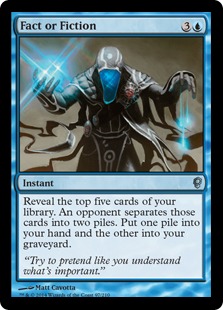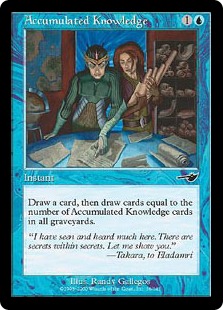Last weekend at Pro Tour Dragons of Tarkir we witnessed an embarassingly long appeal process when Patrick Chapin was given a game loss in the deciding game of his round six feature match against Michele Ancona. Patrick chose a card (Tasigur, the Golden Fang) off Ajani, Mentor of Heroes‘s second +1 ability and put it on the table touching the rest of his hand without revealing it first.
The judges ruled that because the card touched the other cards in his hand, he improperly drew it because he had no right to put it in his hand before revealing it. Patrick rightly and understandably tried to plead his case, arguing most persuasively that everyone could tell which card he chose and he hand’t put his hand back into his actual hands. He asked the table judge and the head judge to exercise their discretion to downgrade the penalty to a warning, because it was an honest mistake that was rectified by revealing the card while it was still distinct among the face-down cards comprising his hand.
Patrick made some other, less persuasive arguments, but who came blame him? At the time, he was almost certainly about to win the game. After drawing off Ajani he was going to ultimate Ugin, the Spirit Dragon and if he didn’t immediately win off something like two Siege Rhino triggers, he was almost assured to win on the next turn. Patrick and Michele were battling at the “king of the hill” table with 5-0 records. The error gave Patrick his first match loss of the tournament. When his best argument was rejected, he tried some weaker arguments in the hopes of somehow salvaging a win he gave away by failing to reveal.
All of this was broadcast on the official pro tour stream. Randy Buehler made some comments that Patrick was trying to convince a judge to cut him a break, and that this was how judging used to be back in the early wild west days of the pro tour. Randy suggested that Patrick might be harkening back to those old times, effectively saying on stream, “Hey Patrick, this might have worked in 1997 but it doesn’t now.”
As I watched the coverage (on the rebroadcast Friday evening) I was surprised that Randy said this and felt it was unfair to Patrick. After all, I made a similar appeal on day two of Grand Prix Orlando, when I was given a game loss for playing the wrong card from my hand as a morph. I wrote about that here. That was right after Khans of Tarkir released, and I successfully appealed and got it reduced to a warning, because it was easily verifiable that I meant to play my Krumar Bond-Kin instead of the only other card in my hand, another five drop black creature, Swarm of Bloodflies. I did the same thing as Patrick—made an illegal game action, by accident, that the rules punish with a game loss. But it was obvious I made a mistake, we discovered it during the very next combat when I traded off the morph and was shocked to see it wasn’t the Bond-Kin, which was the only card in my hand.
Patrick was 100% correct to appeal and argue his case, and it was even reasonable for him to think he might succeed. That’s not angle shooting or cheating or manipulating the judges. It probably shouldn’t have been broadcast, and watching it makes Patrick look unfairly whiny when he is simply advocating the fair and just application of the rules to avoid losing a high-stakes match on a technicality.
Cedric Phillips wrote that Wizards should not have broadcast the whole thing on its official coverage stream. While I think Cedric makes a bigger deal out of it than is warranted, I agree that Magic coverage should not broadcast extended arguments with judges during an appeal and after the ruling is final. The appeal process is an important part of the rules enforcement maintaining the integrity of competitive Magic. Patrick shouldn’t be embarassed on live coverage for doing what he is allowed and encouraged to do. We want players to appeal adverse rulings when appropriate, and judges regularly encourage players to discuss their rulings to foster understanding and respect for Magic’s judicial system. We don’t want to discourage players from participating fully in resolving judge calls. The naked coverage, without commentary, might or might not be embarassing or more appropriately kept private. But when you add Randy Buehler’s skeptical commentary, Patrick gets unfairly painted in a bad light. Wouldn’t we be better off never broadcasting these types of judge interactions?
That argument makes me a little uncomfortable, however. As you may know, I spend my days lawyering. There’s a long-running movement to force the United States Supreme Court to allow cameras to broadcast their proceedings. Did you know that today, in 2015, you cannot bring a camera (still picture or video) into the Supreme Court chambers to record their arguments? In the next month or two, the Supreme Court will hear cases that decide whether same-sex couples have a right to marry, and if President Obama’s comprehensive health care law can continue to operate as written. (The health care issue involves the power of the federal government to subsidize certain state-level insurance exchanges—really esoteric stuff, but an adverse ruling could eradicate the entire system on a technicality.) These are huge issues that will change the law and the lives of countless Americans. And we can’t watch the argument unless we are one of the lucky handful that can get into the courtroom to see it in person! Isn’t that crazy?
The Supreme Court has resisted for years, and they get to decide whether to allow cameras. Their best reason explanation is this: the arguments focus on technical details that could look embarassing if broadcast on mass media. The Court doesn’t want to be demagogued. They don’t want commentators making unreasonable criticism about things that the Court does that it is supposed to do. Does Justice Ginsburg want Fox News to broadcast a snippet of argument where she seems obsessively focused on some seemingly irrelevant detail? Does Justice Scalia want to be mocked on CNN for demanding procedural consistency in death penalty habeas corpus cases? Fair or unfair, the Court could look bad on national television. Congress gets televised constantly and we can all see what buffoonery goes on there. People tend to view the Supreme Court more favorably than Congress, so you can understand why the justices aren’t too keen on pulling back the curtain.
I think the Supreme Court should broadcast its arguments. A few years ago I worked as a law clerk for the U.S. Court of Appeals for the Ninth Circuit. That’s the court directly below the Supreme Court, and it covers the entire western United States. It’s a huge court that decides thousands of important cases a year. Many of the Supreme Court’s cases are direct review of Ninth Circuit decisions. And they put all their arguments up on their website for the public to watch. You can tune in live here, assuming you want to hear esoteric legal arguments at 10am Pacific on a weekday. During my year at the court, we had a number of high-profile arguments, including the first of many in the challenge to California’s ban on same-sex marriage. Those were broadcast and nothing bad happened.
All of this sounds like the same argument against broadcasting the Chapin incident. So why do I want the Supreme Court on television but Magic judge calls kept private? Well, the more I think about it, the less sure I am that Magic judge calls should stay off the air. The comparison has made me think: if something is good and natural, and a part of the game I love, why try to keep it private? There are of course some activities in life that are good and natural that we generally don’t broadcast to the public. But why should Magic’s judicial process be treated like sex?
The Supreme Court is wrong to keep their proceedings off the air. We shouldn’t have to wait for a second-hand written summary of what the Court said at argument. They want to tell us who we can or can’t marry, how much money we can pay political candidates, whether a state can execute you for committing a crime? Let us watch the lawyers argue for the side we follow, we believe in, we depend upon. Sure, the justices can deliberate in private and (usually) speak with their clerks in confidence. But when they sit in public and hear arguments from the lawyers in the case, we should be able to watch at home.
With Magic, though, I’m not so sure the judge calls are worth broadcasting. The Supreme Court’s decisions matter. A lot. A judge’s ruling on drawing an extra card on accident? Not so much. Magic is not an event of national and political importance. I don’t need to see Patrick Chapin pleading his case to avoid costing himself an undefeated record at the pro tour. I do think his actions provide a good view of how to respectfully and appropriately advocate your side of the dispute, though. Maybe that video will help new tournament competitors navigate the confusing and treacherous waters of professional rules enforcement. I think it’s more likely to cause embarrassment, though, and it would be better to leave those scenes off the air.
But maybe I’m wrong. Maybe Cedric is wrong. We probably shouldn’t go out of our way to broadcast these appeals during tournaments, but it won’t hurt to show them once in a while. Maybe as long as we can avoid belittling players on air for exercising their right to appeal a ruling, we should let that process be seen.
Just something to think about.
Carrie O’Hara is Editor-in-Chief of Hipsters of the Coast.





